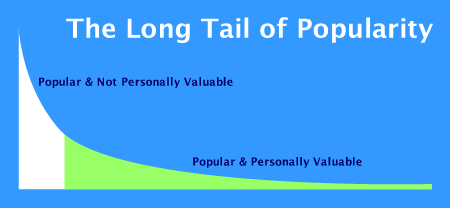The Long Tail of Popularity
Update: Simplified the beginning…
In his 2005 Les Blogs presentation Doc Searls, in his explanation of what blogs are and what they are not, suggested that:
“We are all authors of each other.”
What exactly does Doc mean by this? Does he mean that we author other people’s lives, and they ours, whether or not we want them to? Or could it mean something more optimistic, that we author each other gladly?
Then there’s the problem of popularity. How does popularity fit into the idea that we all author each other? Don’t popular things help shape us, too? Do the voices that add up to popularity author us in the aggregate?
Popularity is maligned as much as any attribute known to man. If you are popular, you are probably not worth paying attention to. It’s as if we are saying: “You already have too much attention, and I’m not going to give you more.”
But I think there is much more to popularity than unwarranted attention.
Update: Simplified the beginning…
In his 2005 Les Blogs presentation Doc Searls, in his explanation of what blogs are and what they are not, suggested that:
“We are all authors of each other.”
What exactly does Doc mean by this? Does he mean that we author other people’s lives, and they ours, whether or not we want them to? Or could it mean something more optimistic, that we author each other gladly?
Then there’s the problem of popularity. How does popularity fit into the idea that we all author each other? Don’t popular things help shape us, too? Do the voices that add up to popularity author us in the aggregate?
Popularity is maligned as much as any attribute known to man. If you are popular, you are probably not worth paying attention to. It’s as if we are saying: “You already have too much attention, and I’m not going to give you more.”
But I think there is much more to popularity than unwarranted attention.
Memetrackers!
The current explosion of memetrackers (Memeorandum, Tailrank, Megite, Findory) is a great place to observe these questions play out. Gabe Riviera’s Memeorandum, one of the first of the bunch, started with a list of RSS feeds and grew out organically from there (at least that’s the legend I’ve heard several times). On tech.memeorandum, you can get the latest buzz in the tech blogosphere, and you can track a meme for the 10 or 12 hours that it’s hot. Unfortunately, as many have pointed out, it sometimes feels like an echo-chamber with the same blogs bubbling to the top consistently.
I once heard that the most popular bloggers weren’t necessarily the ones with the best ideas, but they were the ones who could amplify those ideas most effectively. Just like any other writing, I guess.
Today’s hottest blog, of course, is Mike Arrington’s Techcrunch, a clearinghouse for the latest Web 2.0 news and product releases. Mike’s success seems to rely on his ability to quickly get the story and tell the most relevant details before others do. His tireless excellence is really something to watch, making bloggers like me wonder how many hours there are in his days.
Technorati, who likes to throw around big numbers, has the Technorati 100, a list of popular blogs which, according to this study by Tristan Louis, changes rather frequently. Today’s Doc Searls is tomorrow’s … what was that guy’s name again?

Popularity
The energy put forth in figuring out how to get onto Memeorandum, Techcrunch, and Technorati is proof that people look to those services as a light in the fog. People want to be and want to know what’s popular, and the primary utility of these services is to help them do that.
Popularity, it seems, is the goal of many a blogger. We get a kick out of seeing our name on the lists. If I was Boing Boing sitting in the #1 spot in the 100, I would be pretty damn pleased with myself. I might even take a vacation.
This makes sense because outside of acclaim from our readers we really have no idea if what we’re writing is jiving with people. For a quick calculation we instead look to numbers and rankings to suggest how well we’re doing.
So if getting popular is at least part of our goal, why is there always such a negative connotation about it? Seth Finkelstein, in response to a Scott Karp post in which he laments the rise of popularity sites like Digg and Reddit, reiterated a common distinction between popularity and importance:
“Finding what’s *popular* is easier and more profitable than what’s “important”. In order to find the popular, you just poll either the crowd, or the demagogues (people who are experts – at what’s popular). That’s very simple (relatively speaking).
But how do you find what’s important, what you *need*? What do you code for? The first cut is to poll a niche rather than a general audience. But problems there are that there might not be enough of a sample, and the economics are even less supportable.
These questions don’t often get discussed extensively because the hype-machine runs on populism and demogoguery, so that’s what gets amplified and echoed. But also, there’s more to discuss, and moreover, a service which acts to find the popular is, recursively, a popular topic for coverage.
There is that word again: hype. Whenever this word is mentioned, it is in relationship to something that the author wishes would go away. Same with populism. Never mind that millions of people are talking about it. It’s hype. Forget it.
The endless struggle to get at personally-relevant information, to weed out the hype and focus on what is important to us, is the defining problem on the Web at this time.
Importance is relative
The problem, as Seth points out, is that each of us has a different definition of importance. But that’s only part of the problem. The other part is that most of us secretly yearn for popularity. So even as we argue against popularity as an idea, we really don’t mean that popularity isn’t important to us. Things that are popular that we don’t find important don’t make sense, but if we were popular, if our blog was in the top 100…well then that’s OK.
But I don’t think that should stop us from trying to alleviate the problem. I think we’re learning more about this as we go. For example, I think we can distinguish between two types of popularity:
Echo-chamber popularity
This is the popularity that Seth was talking about and that everybody hates. It’s the one that people complain about when they complain about Memeorandum, about Britney Spears, about the wicked pretty cheerleader and her dumbass jock boyfriend.
Interestingly, however, our anger at this type of popularity can only occur after we’ve made the judgement that it isn’t important to us. Most people don’t complain that the Beatles were popular because they’re a pretty good band. Their popularity was justified. And very few people complain about memeorandum if they’re the ones getting consistent traffic from it.
Only after we’ve read the stories on memeorandum can they be part of the echo-chamber. The first reading, the reading at which the information was new to us, was actually valuable in some way, if only to let us know that it wasn’t important to us.
Word-of-mouth popularity
This is the popularity that we all value. When a friend recommends a movie to us, we listen, even if they’re talking about the same damn movie everyone else is. Because it is coming from a personal authority, we don’t consider it a part of the echo-chamber, we consider it valuable information. People have a great way of knowing what will be important to their friends, and so probably won’t give them the same echoes that they hear elsewhere.
We all want people to say nice things about us. If we become popular that way, then all is well.
The problem is that it’s really hard to have one type of popularity without the other. In fact, they’re basically the same thing, except one is popularity that we value and the other isn’t. It all depends on whether or not we find the popular thing valuable. If we don’t, we start saying things like “hype” and “echo-chamber”. These words actually say more about the relationship between the person saying them and the topic than they do about the topic itself.
Most things aren’t valuable to us
Just as the Power Law dictates that in a network some things will be popular and most things won’t, some popular things we’ll find important but most we won’t.

The technologies that we’re using to leverage the network now, most particularly RSS, are giving us more access to more things. With that comes more things that we don’t value. Is this a failing of the network? Or is it a failure of the people on the network? Or is it a failure of the technology? Is it a failure at all?
Probably not. It’s simply that we have more of everything, and are already taking for granted the increase in valuable information because there’s so much useless information as well. Of course, there was a time before cell phones and computers, but who the hell remembers that?
What we need is to model that in our software in a way that allows us to make judgments about which information is valuable to us, and which is merely hype. In other words, we need to be able to pick out those popular things that we still value, despite our fears of popular things. I think this is what Dan Bricklin is getting at in his insightful article: When The Long Tail Wags The Dog.
So I think Doc is right, we are all authors of each other. We value the same things we’ve always valued: the information we receive from family, friends, writers we admire, and other personal authorities. And oh yes, we’ll value a small portion of the popular things too, because we don’t discover everything through the people we know. We’ll probably also continue to deride popularity as a bad idea, because we always have, ever since the cool 6th graders were listening to Guns and Roses and using the F-word.
And all the while we’ll secretly ego-surf to see how popular we would be if we believed in that sort of thing.
Previous
Next